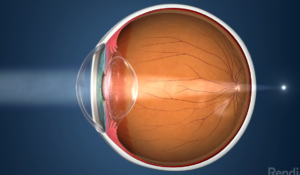Great vision is a necessary aspect for a person’s overall well-being. Vision can affect one’s lifestyle, work functions, hobbies, and even hitting the gym. Hyperopia, commonly called farsightedness, is one of the most common types of vision issues and causes the impaired ability to see items that are at close range. This refractive error can make activities, like sewing, applying makeup, cooking, or reading quite difficult. Just like myopia, hyperopia can be anywhere from minor to severe and could cause other unwanted discomforts that can bother you in your everyday life. Thankfully, patients with farsightedness have options to correct their vision. At Chu Vision Institute, our experienced team can determine if you have farsightedness and go over all of your available treatment choices. Schedule your appointment at our Bloomington office for a thorough eye exam with Dr. Ralph Chu or a member of his team and come one step closer to getting great vision.
SYMPTOMS OF HYPEROPIA
People with farsightedness notice their close-up vision is not very crisp. The inability to clearly see objects near the eyes is typically the most dominant symptom of hyperopia. Nevertheless, farsightedness that isn’t obvious yet or has been neglected does sometimes lead to eye strain, also known as asthenopia. The constant strain on the eyes caused by carrying out close-up tasks, for example, studying, writing, or using the computer, can trigger migraines, dry and aching eyes, and stiffness in the upper body. Those who currently use corrective lenses for hyperopia but are still having these symptoms should have an eye exam to find out whether their prescription should be altered.
WHAT CAUSES FARSIGHTEDNESS?
Most often, farsightedness is hereditary. The impaired close-up vision of hyperopia is caused by the shape of either the eyeball itself or the cornea. When the eye is not long enough from front to back, it impacts the curvature of the eye, creating problems with how light enters the eye. Alternatively, when the cornea is not curved enough, light coming into the eye can’t be focused onto the retina correctly. Usually, hyperopia exists from childhood; however, children can eventually overcome their farsightedness as their eyes keep maturing. Farsightedness is often confused with presbyopia (age-related loss of near vision). Both conditions affect near vision, but they are two specific issues. Presbyopia is reduced near vision due to the hardening of the eye’s lens. Presbyopia is part of normal aging and is typically found in most people over 40 years old.
DIAGNOSIS OF HYPEROPIA
During your appointment at Chu Vision Institute, our care team will perform a comprehensive eye exam to determine your overall eye health. Every comprehensive assessment will incorporate routine eyesight tests to detect any refractive vision issues, such as hyperopia. The tests we do to find out whether you are farsighted are the exact same as those performed to diagnose myopia (nearsightedness). These basic tests generally involve the person demonstrating how clearly he or she can read the letters on an eye chart and one or two tests to examine whether light is hitting the retinas properly. In the event that we detect hyperopia, the optometrist will do tests to establish the correct prescription for your lenses.
HOW IS FARSIGHTEDNESS TREATED?
The exams for hyperopia aren’t the only similarities it has with myopia. The possible treatment methods are also the same and allow people to choose either glasses or contacts based on their lifestyles. Our team frequently suggests that people opt for a combination of the two to work with specific activities. Many individuals with hyperopia may also consider refractive surgery, like LASIK. Once we have completed your assessments, we can talk with you about whether laser vision correction could be a potential choice for you. For people who are eligible, LASIK and PRK can offer life-changing, long-lasting outcomes.
CLEARER VISION FOR GREATER DAYS
Patients who live with hyperopia can have trouble completing several types of daily activities, leading to problems at work and even in their personal lives. Getting the prescription eyeglasses or contact lenses you need to restore your near vision can make a significant change in your life. Contact us at Chu Vision Institute to plan your eye exam with a member of our team if you have developed trouble seeing close up. We have helped numerous Minneapolis, MN residents achieve their most precise vision.
Find your true north with New Vision.

